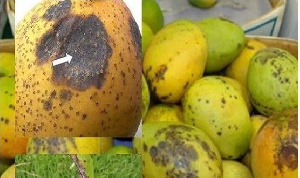Mango farms in the Kintampo North municipality have been massively attacked by mango bacterial black spot disease, raising fears of poor harvest among farmers in the area this season.
The farmers say they risk losing their harvest this year, noting they do not have the financial strength to undertake mass spraying exercise to rid their farms of the disease, hence need assistance.
The bacterial black spot is a very serious disease of mangoes and it causes cracks in both the trees and the fruit, resulting in the fruit getting rotten and dropping from the tree prematurely.
Due to the available vast expanse of arable land in the Kintampo area on which mangoes thrive, the area has become one of the major spots for mango plantation in Ghana, especially the traditional and the grafted species.
A total of 240 farmers in the Kintampo area are engaged in the cultivation of the grafted mangos covering a land area of 3,000 acres.
Although they say the yield on their farms has also been encouraging, they said the invasion of the blackspot disease has troubled them since it is highly likely to affect their harvest.
They told TV3 they have no known agro-chemical that can be used to combat the disease. They are therefore compelled to spend time man hours to prune the affected mango fruits on the trees.
One of the farmers, Juliana Nsiah, whose 10-acre mango plantation has been affected by the blackspot disease, the disease would cause her to lose.
David Opoku Sarfo, chairman of the Kintampo Mango Farmers Association said his 90-acre mango farm which used to produce at least 150 tonnes of mango gave him less than 50 tonnes this season due to the disease.
An economic assessment survey conducted by the Agric Department at Kintampo in 2015 showed the cost of the fruit loss to farmers was estimated at nineteen point GHC19.9 million at the time.
It also indicated an amount of GHC5.6million to undertake mass spraying of mango farms in the area to protect the fruits from the disease.
Regional News of Sunday, 28 May 2017
Source: 3news.com

















